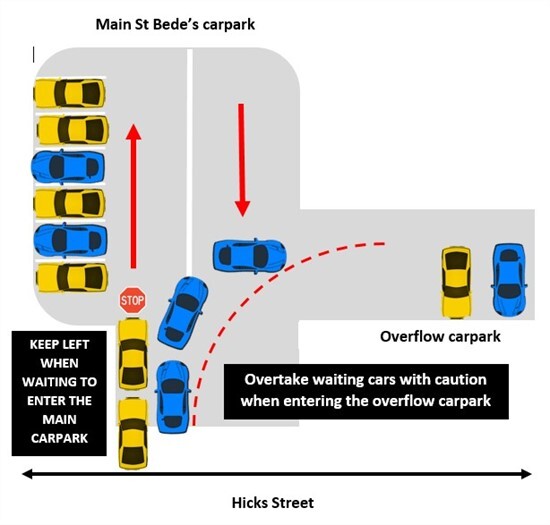Filter Content
Who is Saint Bede?
- He is the Patron Saint of Scholars
- He was sent to live in a monastery at seven
- He wrote poetry and enjoyed music
- He had interests in history and science
- He translated the books of the Bible into Latin
- He completed his translation of the Gospel of Saint John into English on the day he died (he did this so that it was accessible to the poor)
This week we celebrate the feast day of St Bede. Each class was involved in a small prayer liturgy to celebrate and our students wrote some poems to share with one another.
Following a parent concern regarding carpark safety, please ensure that you exercise caution and consideration for students and other drivers. We ask that parents waiting for access to the main carpark wait to the left of the driveway so that other cars can overtake to access the bottom overflow carpark.
Thank you.
The enrolment period for ACT Catholic schools
has been extended until tomorrow
29 May
Catholic Education are using an online enrolment application tool which is available on the school website
https://enrolments.stbedes.act.edu.au/act-primary-enrol/start
Hardcopy forms may also be downloaded from our website if you prefer and submitted to the school of first choice.
Enrolment forms may be lodged any time between now and the official end of the enrolment period, tomorrow, 29 May.
Please note ALL applicable listed documentation must be supplied regardless of the lodgement method.
Offers of places for 2021 will now be made at the beginning of July.
(Excluding current Year 6 students)
If your child is leaving St Bede’s at the end of this year, would you please notify Julie or Breen as a matter of courtesy. This includes those who have applied for a place at Marist College, St Edmund’s College and CGS. Although we hate to see any of our families departing, our planning for 2021 will soon be under way so it's important we have this information as soon as possible.
The St Bede’s Parent & Friends Association met this week. The fundraising committee gave an update on a time–line concerning events for 2020. Unfortunately, due to COVID-19, no clear plans can be communicated to the community at this time as we are unsure when large gatherings will be able to take place. We are hoping that a clearer picture will be available at the end of this term. We think getting together as a community (without the kids) for a fun event is very important and we will be making every effort to make this happen at some point and in some form.
Watch this space!
SUCCESSFULLY TRANSITIONING STUDENTS BACK TO SCHOOL
The recent home-schooling experience of Australian students is about to end with most states and territories transitioning kids back to school. For parents, many of whom have discovered just how complex teaching can be, the return to school will be a welcome relief. For children, going back to school may bring a mixed bag of feelings. Eager anticipation about reconnecting with friends and teachers will probably be accompanied by a level of anxiety about what school may be like upon return.
School undoubtedly will be a different experience for students post COVID-19. For a start they’ve just experienced a prolonged period of remote learning and an absence from their friends which will take time to process when they return to school.
With organised extra-curricular activities put on hold, most children have had a great deal of free time which has placed the locus of control firmly in their hands. I suspect many kids will grieve their lack of freedom, as they’ve had a glorious glimpse of what an unstructured life is like. It may take some time for them to get back into the swing of school life.
With the return to school imminent here are some sensible strategies to make adjustment easier for students.
Get ready for a return
Worriers and anxious types in particular like to know what’s ahead so your approach will make a difference. Prepare your child for a return by discussing the safety procedures the school will be implementing. Let young children know that an adult won’t be accompanying them past the school gate. Ask your child what they are looking forward to and check in with how they are feeling about a return. Validate any fears and apprehensions and correct any misconceptions.
Go slowly
This period will mirror the start of the school year when your child had to adjust to new teachers, different classmates and a new year level. Adjusting to change takes a great deal of personal energy, so you child or young person may become tired, grumpy, even moody at home. Make allowances for these personal changes and make sure they have plenty of free time to unwind after school.
Focus on reconnection
Make reconnection the theme for your child’s return to school. He or she will have to reconnect with friends, teachers and learning, which takes time. In all likelihood, your child’s teachers will use many strategies to help your child connect with their friends, reflect on their time at home and move them back into full-time learning mode. Support these activities and keep your learning expectations for your child in check.
It may take the rest of the term for some children to adjust to their life back at school.
Stay calm
Anxiety is very contagious, so it’s easy for us as parents to take on our children’s worries and fears. The reverse is true, and kids can pick up our worries, taking them on as their own. As a buffer against anxiety ensure you do something each day that brings you some joy, whether it’s listening to music, going for a walk or having a coffee with a friend.
Look after yourself
In recent months parents and teachers have been doing significant emotional labour. The learning and adjustment curves have been massive, with little time to relax and take a break. Consider your own emotional resources and make your wellbeing a priority, which will make it easier for you to stay calm if your child experiences difficulties.
Communicate confidence
It’s a fine line that many parents walk between being flippant (‘you’ll be right’) and showing confidence (‘you’ll do okay’) when kids struggle to adjust to change. My research into childhood anxiety reveals that children and young people want parents and teachers to understand their fears and anxieties, and to coach them to negotiate difficulties including adjusting to change. You can support your child through sharing stories of resilience, focusing on the positives and letting them know that will eventually adjust.
The COVID-19 pandemic has thrown up many difficulties requiring us all to quickly adapt to new situations. Flexibility is a prime characteristic of resilient people, so if nothing else, getting through these challenging times will make us all more resilient.
by Michael Grose










